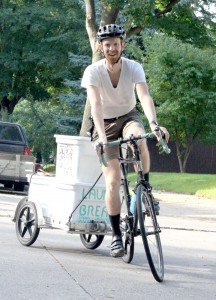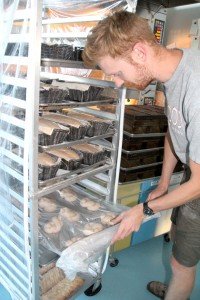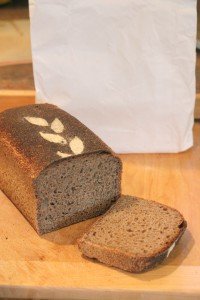By TESHA M. CHRISTENSEN
Christopher MacLeod is known as The Bread Man to local residents.
 On Tuesdays and Wednesdays, the Bancroft resident crisscrosses South Minneapolis delivering freshly baked bread on his bicycle.
On Tuesdays and Wednesdays, the Bancroft resident crisscrosses South Minneapolis delivering freshly baked bread on his bicycle.
His trailer promises beards, breads, and good vibes, the English translation of his name “Laune.”
Photo right: On Wednesday and Thursday mornings, rain or shine, Christopher MacLeod of Laune Bread can be found delivering bread via bicycle in South Minneapolis. The delivery area boundaries are between Interstate 35W east to Minnehaha Ave., and 28th St. south to Minnehaha Pkwy. (Photo by Tesha M. Christensen)
Laune Breads are naturally leavened, crafted with ten digits and friendly ingredients, and locally sourced.
When he began the business last October, MacLeod was the only local bakery using organic grains. He’s one of two delivering bread by bicycle in the Twin Cities.
“I view this business as a project for myself,” said MacLeod.
After living on the West Coast, MacLeod wanted to experience someplace new, so he moved to Minnesota about two years ago. He envisioned an abundance of wheat in the Midwest, MacLeod recalled, and thought he’d learn a lot about the process of growing it and transforming it into flour. When he got here, he discovered that there weren’t any local bakers using local wheat. And they weren’t making German-style breads either, but instead, the majority of them were baking white breads and yeasty breads.
He’s worked to identify local growers who use organic and sustainable methods, including Bakers Field in Northeast and Whole Grain Milling, and buys his flour from them.
Connections
Currently, MacLeod bakes two days a week in the kitchen at Sun Street Breads, 4600 Nicolet Ave. S. The owner there began by baking in someone else’s kitchen, and she’s paying it forward, MacLeod explained.
 Photo left: Christopher MacLeod of Laune Bread checks bread and pretzels as they rise. While most bakers work in the early morning hours when no one else is awake, MacLeod bakes in the early evening and delivers the next morning by bicycle. With that model, he can interact with his customers. “I get a lot of feedback,” MacLeod pointed out. (Photo by Tesha M. Christensen)
Photo left: Christopher MacLeod of Laune Bread checks bread and pretzels as they rise. While most bakers work in the early morning hours when no one else is awake, MacLeod bakes in the early evening and delivers the next morning by bicycle. With that model, he can interact with his customers. “I get a lot of feedback,” MacLeod pointed out. (Photo by Tesha M. Christensen)
He doesn’t want a storefront. “I prefer to spend my time worrying about bread and sourcing better products,” said MacLeod.
He explained that instead of putting money towards a building, he wants to support small farms and mills, in part to reduce the total food miles involved. Although Minnesota is a large grower of wheat, it is often shipped to Colorado to be milled and then shipped back to Minnesota to be used or exported overseas. In fact, 50% of the wheat grown in Minnesota is exported to places such as Korea, Japan, and Europe, MacLeod pointed out.
He also wants to provide a connection between his subscribers and farmers. His weekly newsletters include information about bread and grains.
‘Bread I make is the bread I want to eat’
MacLeod compared his subscription service to that of a CSA (community supported agriculture).
 Photo right: Photo left: Christopher MacLeod of Laune Bread likes his bread with a moist interior and a chewy exterior, and uses at least 50% of whole grains in his breads. The sourdough is for more than taste, and there is no yeast added, making the bread easier to digest. (Photo by Tesha M. Christensen)
Photo right: Photo left: Christopher MacLeod of Laune Bread likes his bread with a moist interior and a chewy exterior, and uses at least 50% of whole grains in his breads. The sourdough is for more than taste, and there is no yeast added, making the bread easier to digest. (Photo by Tesha M. Christensen)
While most bakers work in the early morning hours when no one else is awake, MacLeod bakes in the early evening and delivers the next morning by bicycle. With that model, he can interact with his customers. “I get a lot of feedback,” MacLeod pointed out.
Most bakeries are pretty wasteful, and much of what they make gets thrown in the trash at the end of the day. With a subscription service, MacLeod bakes to order and has very little waste.
All of his breads are sourdough, which makes them easier to digest and healthier. While many bakers add sourdough for flavor, they still use yeast. MacLeod relies on naturally leavening only. When he eats other’s breads, his stomach tells him right away whether it is a true sourdough or not.
“The bread I make is the bread I want to eat,” said MacLeod.
He lets the flavors in the crust and interior meld during a longer rising period and then bakes them at a high temperature. “I think it adds more sweetness and nuttiness,” MacLeod remarked.
For much of history, people lived off of whole grain bread, getting the nutrients they needed. Yet, the peasants always wanted to have white bread, like the nobility. Today, he pointed out, the shift is away from Wonderbread and back toward whole grains.
‘Bread time’ in Germany
MacLeod’s love for bread can be traced to the college year he spent studying in Munich, Germany. The bread he ate there was a far cry from the sliced white bread he’d eaten in America. Rather than eat a typical meal with a plate of food following an appetizer, in Germany he was introduced to brotzeit, or “bread time.”
“It seemed more like a personal meal,” MacLeod observed.
Plus he was friends with a local whose parents owned a bakery and lived upstairs. The smells wafting up from their bakery enticed him.
Back in Portland, OR, MacLeod completed his degree in communications and German in 2011, only to discover that marketing firms weren’t hiring. So, he started working at a German bakery there in Portland and learned the basics of mixing and shaping, getting his foundation in bread making. A year later, he was hired by a wood-fired bakery in northern California. It was there that he developed his ideas of bread.
It’s important to MacLeod to use ingredients from the region or state. Because of that, he doesn’t make olive bread in Minnesota. Instead, he incorporates items such as cranberries, apples, and roasted leeks. He builds upon the German style of using a lot of seeds and some dried fruits. The German bread is denser, although he works to make it lighter by using a lot of water. He likes his bread with a moist interior and a chewy exterior, which helps the shelf life. MacLeod uses at least 50% of whole grains in his breads.
Bread delivered
Each week, MacLeod sells a half wheat, half white sourdough made with whole wheat flour, wheat flour, rye flour, salt, and malted barley flour for $7 a loaf. He also offers the Bäckers Whim—a rotating cast of breads that has included Cardamom Raisin Oatmeal, Caramelized Onion, Spelt Sesame, and Roasted Leek and Black Pepper for $8 a loaf.
Other items for sale and delivery include six sourdough wheaty pretzel knots for $10 and seedy granola (454 grams) featuring Skinny Jake’s Fat Honey, an urban Minneapolis apiary, for $7.50.
A monthly bread subscription is $28-30. Or, customers can opt for a bi-weekly service for $14-16.
Delivery to about 70 subscribers occurs each Tuesday and Wednesday morning when the bread is ready to be cut into and eaten. Deliveries via bicycle are made between Interstate 35W on the west, Minnehaha Ave. on the east, 28th St. to the north and Minnehaha Pkwy. on the south.
Or, subscriptions can be picked up at several drop-off points including: On Wednesdays—Conexion at Open Book, Anelace Coffee, The Baker’s Front Porch (41st S. Elliot); on Thursdays—Canteen, Dogwood East Lake and The Baker’s Front Porch (41st S./Elliot).
During the summer, bread was sold at the Nokomis and Tiny Diner Farmers Markets, as well.
For more information, browse launebread.com.
Comments
No comments on this item Please log in to comment by clicking here